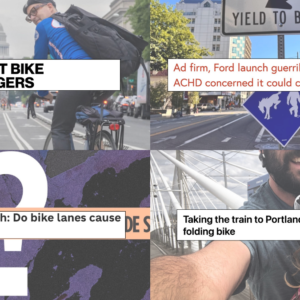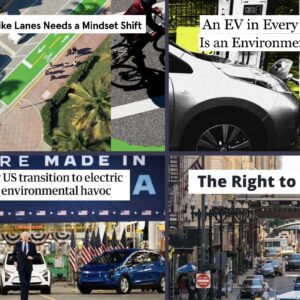Welcome to this week’s roundup! We’ve had glimpses of almost springlike weather, I hope you were able to enjoy it. Our first video is a great one from Brumotti at a soccer (“football”) stadium. There are some great moves, but my favorite is bouncing across the armrests. The other good Brumotti of the week is where he shows the proper way to use a treadmill.
I’m not overly excited about a discussion of helmet safety (and risk compensation/Peltzman effect), but I’m including this (partly) because they do a good job discussing it and (mostly) for the roller trick at the beginning of the clip.
PBOT put up a video showing their post-storm cleanup on Germantown Road. What a mess.
Are you looking forward to pro cycling this year? Here’s GCN’s review of the “team kits”. I love the designs of BMC and Cannondale best. The Trek jersey looks odd- somewhat like a pinstripe suit.
Advertisement
Naturally this is fodder for debate- but I’m willing to watch any semi-legitimate “car vs electric bike” comparison. GCN does a good job discussing power sources (for the car batteries and for the human power), as well as manufacturing costs.
It’s a quiet week, so I’m going to include two videos from the vaults. First, this is a wonderfully shot video about non-racing road cycling. I’m not thrilled with the male-centric viewpoint, but it’s still a great video showing friendly competition and the feelings of cycling.
https://www.youtube.com/watch?v=da9IZqXJuGk
Our second old video is from a 1993 bike messenger race in Berlin. It’s really interesting to hear about the messenger culture during that time.
Honorable mentions: TrainerRoad’s video showing TT rider Justin Rossi’s prep work, video showing installation of the new SRAM eTap (incredibly boring video, unfortunately), and PathLessPedaled at the RAGBRAI route announcement party.
Inclusion criteria: If I’ve missed something, post it in the comments! I prefer videos published in the last week or so. Note if there’s a specific point in a long video that is worth highlighting. Also note if there is colorful language. When it gets to spring, I will delay videos containing pro racing spoilers.
– Ted Timmons, @tedder42







Thanks for reading.
BikePortland has served this community with independent community journalism since 2005. We rely on subscriptions from readers like you to survive. Your financial support is vital in keeping this valuable resource alive and well.
Please subscribe today to strengthen and expand our work.
Thanks Ted. Wednesdays are now my fave.
aw, thanks. too kind!
Among other discrepancies in the GCN bike vs electric car video, why did they take the calorie intake of the bike operator into account but not the driver of the car? Do drivers not need to eat food anymore? I feel like this would have a large impact on their efficiency calculations.
RE: Car vs bike video. I love the ‘Share The Road’ sign depicting equal billing of a pedestrian, bike and car behind them at the Starubux.
We’ve run calculations regarding CO2 emissions of operating an e-bike vs. a gas powered single occupancy vehicle (SOV). This analysis covered only CO2 emissions from fuel usage, including the fuel used to generate the electricity. It did not account for caloric intake of the rider (more on that part in the next paragraph). Using U.S. EPA and Energy Information Administrative data, with a specific focus on Portland’s fuel mix for electricity generation, we determined that the CO2 emissions from fuel of an ebike was about 1.5% that of a gas powered SOV in city traffic. That didn’t account for cars sitting in endless traffic tie-ups. In some states, e-bikes will be a little more CO2 intensive due to heavier dependence on coal to produce electricity.
We attempted to examine the CO2 emissions of food intake required to power an e-bike vs. a completely human powered bike, but found too many variables to consider. Our analysis included the CO2 emissions involved in producing, manufacturing and transporting the marginal extra food consumed by using strictly human power vs. human power with electric assist. Chicken and veggies consumption is far less CO2 dependent beef. From what we can tell, someone who relies heavily on beef for the extra calories need to go all human power vs. electric assist, will cause more CO2 emissions than if they ride an ebike. We acknowledge that someone may find a better way of calculating these emissions and derive a different, and perhaps more accurate result.
When comparing electric cars to electric assisted bikes, expect to consume .5 kWh to charge a 422Wh battery. With moderate assist, moderate pedaling and moderate hills, it’s reasonable to get 30+ miles on a charge. So that is about 60 miles per kWh. A forum of Tesla owners claims about 3.1 miles per kWh. Thus an e-bike’s fuel consumption per mile emits only 1/20th that of an electric car – plus it’s more fun and healthier.
In the big picture, climate change is a global problem, so we need to think about the CO2 emissions of our collective choices more than our individual ones. This is where bikes (electric or otherwise) really shine compared to cars. You can make a short or a long commute using either a car or a bike, but a car culture makes long commutes (even for cyclists) and a bike culture makes short commutes (even for drivers). No matter how efficient cars get, that imposes energy and environmental costs a car culture can’t overcome. The energy and environmental costs of building cars and their components are pretty big as well; I’ve heard estimates that CO2 emissions to build a car are near the magnitude of their average lifetime operational emissions.
As with so many things in history, gas-burning cars were an invention that set humanity forward. Burning coal was way more sustainable than burning wood; burning oil and gas more sustainable than coal. In some ways the march toward sustainability is a march of progress. Car culture, more than car tech, is the dead end.